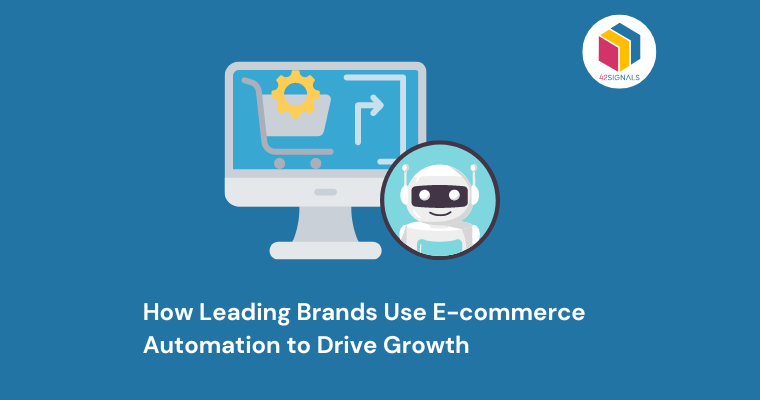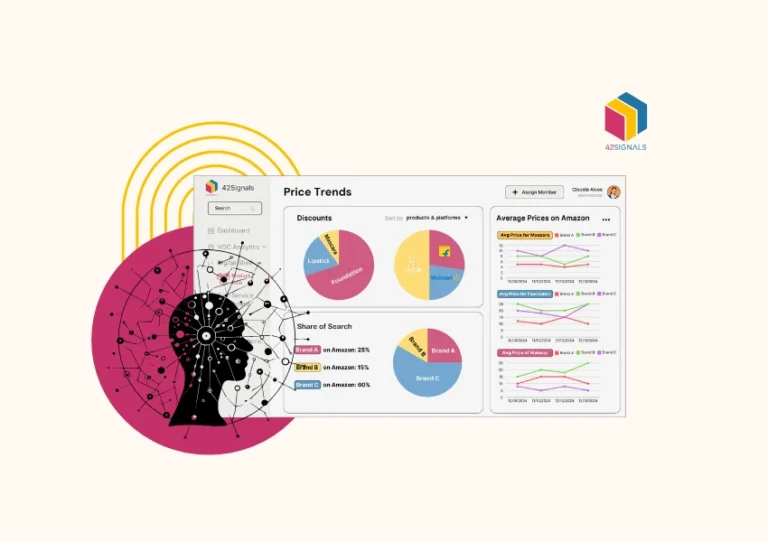What is Ecommerce Automation? How Does it Work?
Ecommerce automation involves using software and tools to streamline repetitive tasks and optimize business processes in online retail. Automated systems can manage various functions like:
- Inventory management
- Order processing
- Customer service
- Marketing campaigns
- Data analysis
These tools work by integrating with existing e-commerce platforms, utilizing algorithms and triggers to perform tasks without manual intervention. Consequently, businesses can operate more efficiently, reduce human error, and focus on strategic growth initiatives. Ecommerce automation not only saves time and resources but also enhances customer experience by ensuring timely and accurate service delivery.

Image Source: BotPenguin
What is The Importance of Ecommerce Automation?
Ecommerce automation is becoming critical due to its ability to streamline complex processes, increase efficiency, and significantly reduce operational costs. Leading B2C and D2C brands harness it to foster a seamless customer experience and gain a competitive edge. Companies automate repetitive tasks like inventory management, order processing, and customer service, freeing human resources to focus on strategic initiatives.
This technology also allows for personalized marketing campaigns through data analysis, ensuring targeted customer engagement. The adoption of automation tools is essential for brands aiming for scalability and sustainability in an ever-evolving digital market.
Here are six key ecommerce automation technologies reshaping the industry and driving success for modern online retailers:
AI-Powered Chatbots
These virtual assistants provide instant customer support, improving engagement and conversions.
Inventory Management Systems
Automatically track stock levels, reorder products, and avoid overstocking or stockouts.
Email Marketing Automation
Sends personalized marketing emails based on user behavior and preferences, enhancing customer retention.
Order Fulfillment Automation
Streamlines the picking, packing, and shipping processes to ensure fast and accurate deliveries.
Customer Relationship Management (CRM) Tools
Automates tracking of customer interactions to improve sales strategies and customer service.
Payment Gateway Integration
Simplifies payment processing and ensures secure transactions, enhancing user trust.
The Landscape of B2C and D2C E-commerce
The landscape of B2C (Business-to-Consumer) and D2C (Direct-to-Consumer) e-commerce is evolving rapidly, driven by increased digital adoption and changing consumer preferences. B2C e-commerce typically involves intermediaries and marketplaces connecting consumers to a wide range of products, whereas D2C focuses on brands selling directly to consumers through their own online platforms. Key trends include:
- The rise of mobile commerce
- Personalization and AI-driven customer experiences
- Seamless omnichannel strategies
Both models emphasize user-friendly interfaces, fast delivery, and efficient customer service to meet growing consumer expectations and stay competitive.

Image Source: Tallyfy
How B2C Brands Utilize Automation for Customer Engagement?
B2C brands leverage ecommerce automation to enhance customer engagement by employing sophisticated tools that streamline communication. These brands use chatbots to provide real-time support, reducing response times and improving customer satisfaction. Personalized email campaigns are automated, ensuring timely and relevant content delivery based on user behavior and preferences.
Social media automation tools engage audiences through scheduled posts and targeted ads, maintaining a consistent brand presence. Loyalty programs are managed automatically, rewarding customers for their interactions without manual intervention. Additionally, automated feedback systems gather insights seamlessly, enabling continuous improvement in service offerings.
Ecommerce Automation Strategies for Optimizing D2C Sales
Personalized Email Campaigns
- Utilize customer data for targeted email content.
- Automate product recommendations based on browsing history.
Dynamic Pricing
- Implement algorithms to adjust prices according to demand.
- Monitor competitor pricing and automatically reprice products.
Inventory Management
- Use AI for demand forecasting.
- Automate stock replenishment to prevent overstock and stockouts.
Customer Service Automation
- Deploy chatbots for 24/7 customer support.
- Implement automated ticketing systems.
Marketing Campaign Optimization
- Use A/B testing tools for continuous improvement.
- Automate ad bidding based on performance metrics.
Order Fulfillment Automation
- Integrate with fulfillment centers for real-time updates.
- Automate shipping notifications and tracking updates.
Streamlining Operations and Fulfillment through Automation
Leading B2C and D2C brands leverage automation to enhance operational efficiency and fulfillment processes. These brands optimize supply chain management, inventory tracking, and order processing by utilizing technologies such as artificial intelligence (AI) and machine learning (ML). Key automation tools include:
- Automated Warehousing Systems: Utilize robots for picking, packing, and shelving.
- AI-driven Inventory Management: Predict demand and manage stock levels seamlessly.
- Order Processing Software: Automates invoicing, shipping labels, and customer notifications.
These innovations enable brands to minimize human error, reduce operational costs, and accelerate delivery times, ultimately leading to improved customer satisfaction.
Personalization and Customer Experience Automation
B2C and D2C brands harness the power of ecommerce automation to deliver highly personalized customer experiences at scale. By leveraging AI-driven tools, these companies can analyze vast amounts of customer data to create tailored product recommendations, personalized email campaigns, and dynamic website content.
Automation allows for real-time adjustments based on individual customer behavior and preferences, ensuring that the shopping experience is both relevant and engaging. Furthermore, automated customer service features such as chatbots and personalized interaction flows streamline support, enhancing overall customer satisfaction and loyalty while reducing operational costs.
Examples of Ecommerce Automation
Customer Service Automation:
Top brands utilize chatbots and AI-driven solutions to handle customer inquiries, providing quick and accurate responses 24/7. This reduces the need for human intervention and enhances user experience.
Inventory Management Automation:
Leading companies implement inventory management systems that automatically update stock levels, reorder products, and track shipments. This ensures optimal stock levels, minimizes human error, and streamlines the supply chain.
Personalized Marketing Automation:
Successful brands deploy automation tools to personalize email marketing campaigns, recommend products based on past purchases, and retarget customers with customized ads. This helps in increasing customer engagement and boosting sales.

Image Source: Weblime
Challenges and Solutions in Ecommerce Automation
While incorporating ecommerce automation, B2C brand, and D2C brands may face certain challenges, including:
Data Integration Issues
Brands often face difficulties integrating various data sources. Using APIs and middleware can streamline this process.
System Complexity
Complex systems can hinder automation. Simplifying workflows and adopting user-friendly platforms can mitigate this.
High Initial Costs
The initial investment in automation tools is high. Opting for scalable, cloud-based solutions can reduce upfront expenses.
Security Concerns
Automation could expose vulnerabilities. Implementing robust cybersecurity measures is crucial.
Staff Resistance
Employees may resist new technologies. Providing comprehensive training and highlighting benefits can ease transitions.
Customizability
Pre-built solutions may lack customization. Opt for flexible tools that allow extensive personalization.
Conclusion on ECommerce Automation
B2C and D2C brands must harness ecommerce automation to sustain growth in today’s competitive market. 42Signals offers advanced analytics and intelligent automation solutions to help businesses scale rapidly and efficiently. By leveraging data-driven insights, brands can enhance customer experiences, streamline operations, and boost profitability.
With 42Signals, businesses can stay ahead of the curve, optimizing their e-commerce strategies for maximum impact. Contact us today to discover how their cutting-edge technology can transform your e-commerce operations and drive unprecedented growth.





